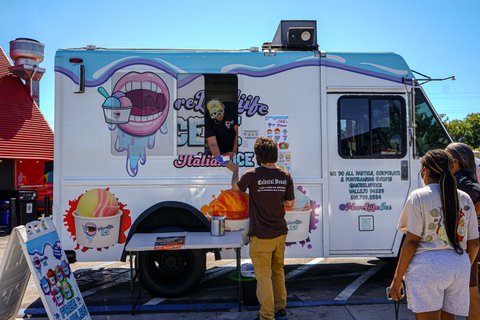
01 Oct A Day In the Life of a Richmond ‘Frutera’
Photo Essay • Edgardo Cervano-Soto
People call out to Juana Raquel as she pushes her green, wooden, home-built cart through the streets of central Richmond. Children pull back peach-colored curtains and wave from second story apartments for her to stop at their apartments. Regular customers greet her in a friendly manner and ask about her day. Construction workers, off break, choose their favorite flavor of raspado — fruit syrup poured over shaved ice — to help cool them down.
Raquel is a ‘frutera,’ a food and fruit vendor. Her cart, sturdy, compact and maneuverable on two rubber wheels, holds what she needs for a day’s worth of sales: underneath piles of ice lie bags of cucumber, mango, watermelon and jicama. On the counter of the cart, Raquel has two coolers, one for the block of ice she scrapes and the other for boiled corn. Chile powder, chamoy, vanilla, strawberry and bubblegum syrup are at Raquel’s disposal. Inside the hollowed cart are bags, filled generously with fried puffy chips.
Raquel used to live and work in east Oakland, also as a frutera. She moved to Richmond, along with her husband, sister and brother-in-law about five years ago. Being a frutera takes adaptability, says Raquel. Her day begins early, even the prior night, when she fries the chips. At one stop, Raquel told a friend and customer how hot her house had become the night before – a hot, late summer night made hotter by her cooking. There is not enough ventilation where she lives, she explained, and despite her constant suggestions, her husband has not gotten to build the extra window.
On her route, Raquel explained that fruteras have no designated sites. Fruit vendors are free to go wherever they want. This makes the business competitive and open, requiring long days of walking. I look at her walking shoes and ask if she has found a dependable brand. She says no, she wears out shoes frequently and hasn’t found one that she would call the best.
The job of being a fruit vendor is not stable, she says. I interject, “Or safe?” Raquel brushes off the question and tells me she feels safe walking in Richmond. If anything, she says, one has to be self aware, but nothing terrible has happened to her on the streets. We get into a discussion about city permits and how fruit vendors are or aren’t recognized by the city. The current permit system in Richmond is not friendly to fruit vendors, says Raquel. The fee to pay for a permit is close to $7,000 per year, she says, an amount she will never earn working as a frutera. According to Raquel, the majority of the fruteras do not carry permits, which make them vulnerable to having their carts, and the food in them, confiscated by police. Raquel has been stopped at least twice, she says, yet when Richmond police cars pass by the block, she doesn’t flinch. She just continues pushing her cart down the sidewalks and streets, to the delight of many.
[flagallery gid=10]






1 Comment